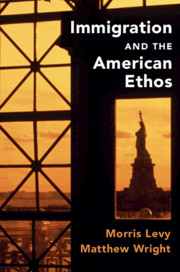Book contents
- Immigration and the American Ethos
- Cambridge Studies in Public Opinion and Political Psychology
- Immigration and the American Ethos
- Copyright page
- Contents
- Figures
- Tables
- Preface
- Prologue
- 1 What Do Americans Want from Immigration Policy, and Why?
- 2 Civic Fairness and Group-Centrism
- 3 Functional Assimilation, Humanitarianism, and Support for Legal Admissions
- 4 Civic Fairness and the Legal–Illegal Divide
- 5 Civic Fairness and Ethnic Stereotypes
- 6 Assimilation, Civic Fairness and the “Circle of We”
- 7 Conclusion
- Notes
- Bibliography
- Index
- Books in the series
5 - Civic Fairness and Ethnic Stereotypes
Published online by Cambridge University Press: 25 January 2020
- Immigration and the American Ethos
- Cambridge Studies in Public Opinion and Political Psychology
- Immigration and the American Ethos
- Copyright page
- Contents
- Figures
- Tables
- Preface
- Prologue
- 1 What Do Americans Want from Immigration Policy, and Why?
- 2 Civic Fairness and Group-Centrism
- 3 Functional Assimilation, Humanitarianism, and Support for Legal Admissions
- 4 Civic Fairness and the Legal–Illegal Divide
- 5 Civic Fairness and Ethnic Stereotypes
- 6 Assimilation, Civic Fairness and the “Circle of We”
- 7 Conclusion
- Notes
- Bibliography
- Index
- Books in the series
Summary
Civic fairness and group-centrism both expect significant ethnic biases in White’s immigration policy opinions in everyday politics. What they differ on is why. Group-centric models tied to racial identities and prejudices argue that negative stereotypes flow out of defensiveness of white dominance and fear and loathing of minority groups. The civic fairness model argues that negative stereotypes may also serve a heuristic purpose for a far wider universe of people, “filling in the blanks” about whether immigrants are likely to meet criteria tied to civic fairness. Both of these interpretations imply that prejudice plays a role in the formation of opinions about immigration. They disagree about what kind of prejudice is at work: group-centric prejudice is motivated simply by one’s (explicit or implicit) dislike of Latinos, whereas civic fairness-driven prejudice occurs because people assume that Latinos violate civic fairness norms. Accordingly, our goal now is to illustrate how civic fairness plays a role in the anatomy of ethnic discrimination itself.
- Type
- Chapter
- Information
- Immigration and the American Ethos , pp. 125 - 141Publisher: Cambridge University PressPrint publication year: 2020



